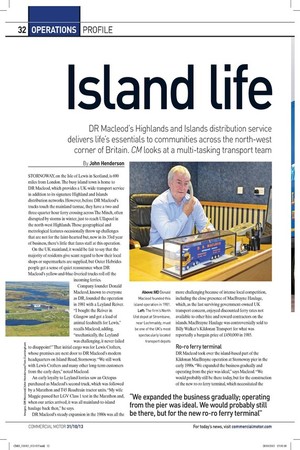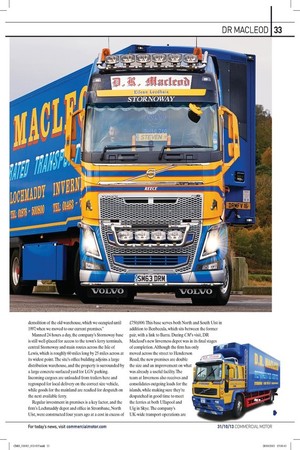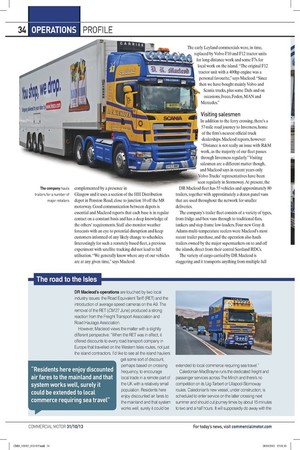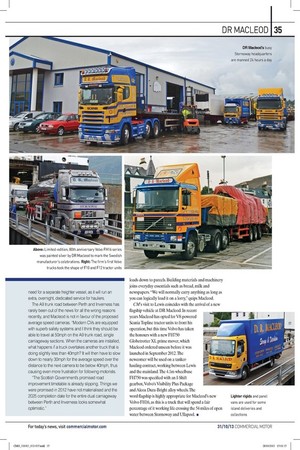Island life
Page 25

Page 26

Page 27

Page 28

If you've noticed an error in this article please click here to report it so we can fix it.
DR Macleod's Highlands and Islands distribution service delivers life's essentials to communities across the north-west corner of Britain. CM looks at a multi-tasking transport team By John Henderson
STORNOWAY, on the Isle of Lewis in Scotland, is 690 miles from London. The busy island town is home to DR Macleod, which provides a UK-wide transport service in addition to its signature Highland and Islands distribution networks. However, before DR Macleod's trucks touch the mainland tarmac, they have a two and three-quarter hour ferry crossing across The Minch, often disrupted by storms in winter, just to reach Ullapool in the north-west Highlands. Those geographical and metrological features occasionally throw up challenges that are not for the faint-hearted but, now in its 33rd year of business, there's little that fazes staff at this operation. On the UK mainland, it would be fair to say that the majority of residents give scant regard to how their local shops or supermarkets are supplied, but Outer Hebrides people get a sense of quiet reassurance when DR Macleod's yellow-and-blue-liveried trucks roll off the
incoming ferries. Company founder Donald Macleod, known to everyone as DR, founded the operation in 1981 with a Leyland Reiver. "I bought the Reiver in Glasgow and got a load of animal feedstuffs for Lewis," recalls Macleod, adding, "mechanically, the Leyland was challenging, it never failed
to disappoint!" That initial cargo was for Lewis Crofters, whose premises are next door to DR Macleod's modern headquarters on Island Road, Stornoway. "We still work with Lewis Crofters and many other long-term customers from the early days," noted Macleod.
An early loyalty to Leyland lorries saw an Octopus purchased as Macleod's second truck, which was followed by a Marathon and T45 Roadtrain tractor units. "My wife Maggie passed her LGV Class 1 test in the Marathon and, when our artics arrived, it was all mainland-to-island haulage back then," he says. DR Macleod's steady expansion in the 1980s was all the
more challenging because of intense local competition, including the close presence of MacBrayne Haulage, which, as the last surviving government-owned UK transport concern, enjoyed discounted ferry rates not available to other hire and reward contractors on the islands. MacBrayne Haulage was controversially sold to Billy Walker's Kildonan Transport for what was reportedly a bargain price of £450,000 in 1985.
Ro-ro ferry terminal
DR Macleod took over the island-based part of the Kildonan MacBrayne operation at Stornoway pier in the early 1990s. "We expanded the business gradually and operating from the pier was ideal," says Macleod. "We would probably still be there today, but for the construction of the new ro-ro ferry terminal, which necessitated the
demolition of the old warehouse, which we occupied until 1997, when we moved to our current premises."
Manned 24 hours a day, the company's Stornoway base is still well-placed for access to the town's ferry terminals, central Stornoway and main routes across the Isle of Lewis, which is roughly 60 miles long by 25 miles across at its widest point. The site's office building adjoins a large distribution warehouse, and the property is surrounded by a large concrete-surfaced yard for LGV parking. Incoming cargoes are unloaded from trailers here and regrouped for local delivery on the correct size vehicle, while goods for the mainland are readied for despatch on the next available ferry. Regular investment in premises is a key factor, and the firm's Lochmaddy depot and office in Strombane, North Uist, were constructed four years ago at a cost in excess of £750,000. This base serves both North and South Uist in addition to Benbecula, which sits between the former pair, with a link to Barra. During CM's visit, DR Macleod's new Inverness depot was in its final stages of completion. Although the firm has only moved across the street to Henderson Road, the new premises are double the size and an improvement on what was already a useful facility. The team at Inverness also receives and consolidates outgoing loads for the islands, while making sure they're despatched in good time to meet the ferries at both Ullapool and Uig in Skye. The company's UK-wide transport operations are
complemented by a presence in Glasgow and it uses a section of the HH Distribution depot in Penston Road, close to junction 10 off the M8 motorway. Good communication between depots is essential and Macleod reports that each base is in regular contact on a constant basis and has a deep knowledge of the others' requirements. Staff also monitor weather forecasts with an eye to potential disruption and keep customers informed of any likely change to schedules. Interestingly for such a remotely based fleet, a previous experiment with satellite tracking did not lead to full utilisation. "We generally know where any of our vehicles are at any given time," says Macleod. The early Leyland commercials were, in time, replaced by Volvo F10 and F12 tractor units for long-distance work and some F7s for local work on the island. "The original F12 tractor unit with a 400hp engine was a personal favourite," says Macleod. "Since then we have bought mainly Volvo and Scania trucks, plus some Dafs and on
occasions, Iveco, Foden, MAN and Mercedes."
Visiting salesmen
In addition to the ferry crossing, there's a 57-mile road journey to Inverness, home of the firm's nearest official truck dealerships. Macleod reports, however: "Distance is not really an issue with R&M work, as the majority of our fleet passes through Inverness regularly." Visiting salesmen are a different matter though, and Macleod says in recent years only Volvo Trucks' representatives have been seen regularly in Stornoway. At present, the
DR Macleod fleet has 55 vehicles and approximately 80 trailers, together with approximately a dozen panel vans that are used throughout the network for smaller deliveries.
The company's trailer fleet consists of a variety of types, from fridge and box vans through to traditional flats, tankers and step-frame low-loaders. Four new Gray & Adams multi-temperature reefers were Macleod's most recent trailer purchase, and the operation also hauls trailers owned by the major supermarkets on to and off the islands, direct from their central Scotland RDCs. The variety of cargo carried by DR Macleod is staggering and it transports anything from multiple full
loads down to parcels. Building materials and machinery joins everyday essentials such as bread, milk and newspapers. "We will normally carry anything as long as you can logically load it on a lorry," quips Macleod. CM's visit to Lewis coincides with the arrival of a new flagship vehicle at DR Macleod. In recent years Macleod has opted for V8-powered Scania Topline tractor units to front his operation, but this time Volvo has taken the honours with a new FH750 Globetrotter XL prime mover, which Macleod ordered unseen before it was launched in September 2012. The newcomer will be used on a tankerhauling contract, working between Lewis and the mainland. The 4.1m wheelbase FH750 was specified with an I-Shift gearbox, Volvo's Visibility Plus Package and Alcoa Dura-Bright alloy wheels. The word flagship is highly appropriate for Macleod's new Volvo FH16, as this is a truck that will spend a fair percentage of it working life crossing the 54 miles of open water between Stornoway and Ullapool. •









































